The post “Either I leave my child in an orphanage, or we both starve” – Behind the Social Creches supporting parents in Moldova appeared first on Hope and Homes for Children.
]]>For over a decade, our partners CCF Moldova have been at the helm of the Social Creches. These community childcare facilities offer free support to vulnerable families, families with children at risk of being placed in orphanages.
Now, our Social Creche model is growing, keeping families together throughout Moldova. Our team sets them up, before passing the reigns to local authorities who fund and operate them. Thanks to your continued support, these creches are getting children off the path to orphanages and back to family.
Will you help bring millions of separated children back to family? Donate today.
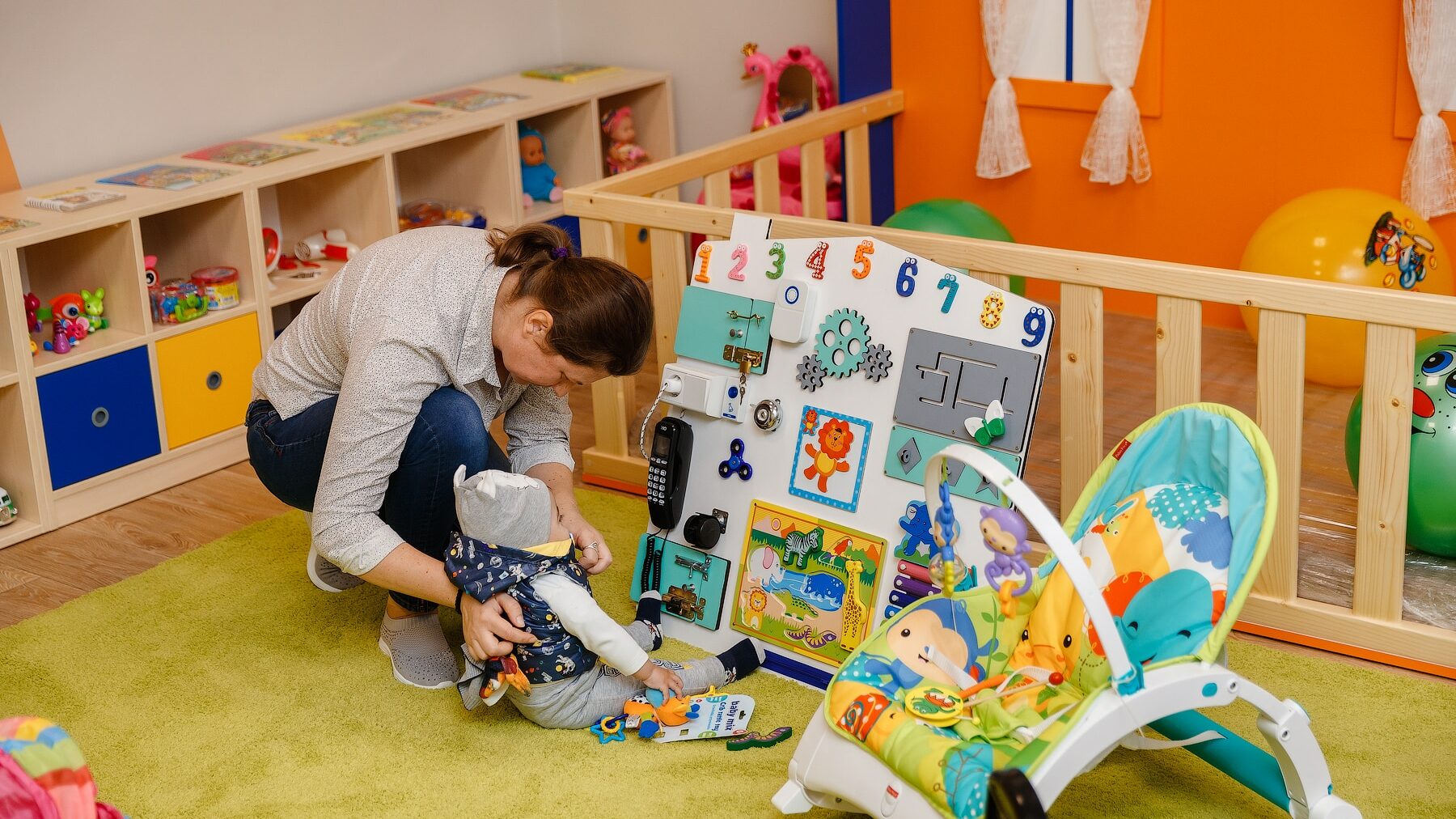
CCF Moldova / Hope and Homes for Children
Why were the Social Creches started?
The Social Creches were started in 2011 in Chișinău.
Dr. Liliana Rotaru, Director of CCF Moldova, remembers the sad conversation that led to its creation.
“We were working with seven mums, five of whom had very young babies. They were single mums with no support from their families. All of them said the same thing to us, ‘we have no choice. Either I leave my child in an orphanage and go abroad to earn some money, or we both starve.”

CCF Moldova / Hope and Homes for Children
In Moldova, accessing support for child care is a huge challenge. State childcare only starts at three years old. Until then, many parents struggle.
“If you’re a single parent and you don’t have resources to pay for private child care, or if you don’t have extended family who can help, then how do you live?”, explains Pete Garratt, our Director of Global Programmes.
Many parents in Moldova feel pressured to move across the border to Russia to earn money. They leave their children in orphanages, hoping one day they’ll be able to take them back. But all too often, that day never comes. And children lose their childhoods inside orphanages.
This is just one of many reasons why 80% of children in orphanages aren’t even orphans. They have families. Families who just needed support.
Opening the first Social Creche
With support from the local Child Protection Department, CCF Moldova opened the first Social Creche in a local community building.
Each of those mums Liliana’s team were working with, who were once forced to choose between food and family, finally had help to keep their children at home. They were able to leave their children in the morning, go to work to earn money, then pick them up at the end of the day. Many of the parents didn’t even know this was a service that existed.

CCF Moldova / Hope and Homes for Children
Since then, our team has opened ten similar Social Creches across Moldova. As of April 2024, 577 children have attended our creches. That’s 577 children supported to stay at home. Where they belong.
Opening a creche in Rezina County
This year, our team opened the newest Social Creche in Rezina County. In collaboration with the local Mayor, Town Council and Child Protection Department, the Social Creche currently provides care for nine local children.
Ala Nosatii, Programme Manager, explains how essential the centre has become to the community since opening in March.
“It’s all about the needs of the family. Kindergarten is expensive. You need nappies, clothes, food and school supplies. But the parents we support don’t have any resources.”
To support these parents, the creche ensures their children have everything they need during the day. This gives parents the chance to find employment, earn money, and strengthen their families for the future. And, most importantly, it’s giving the children the chance to get a solid start in life. Today,
“The creche is wonderful,” says Ala proudly. “Not all of these children have toys and food in their house. But now, they’re fed, happy and playing together.”

CCF Moldova / Hope and Homes for Children
What’s next?
Eleven years since creating this model, our creche system has been recognised by UNICEF and received both domestic and international awards. Now, Liliana’s team is supporting it to grow even further.
“It’s not just enough to have a pilot project, even ten creches,” says Liliana. “We need to help authorities to develop more creches by themselves.”
Now, our team is creating a toolkit so the Moldovan government can carry the torch. Already, they’ve supported the Ministry of Labour and Social Protection to develop new policies and will continue to assist with costing and licensing. Eventually, this will mean Local Public authorities can replicate our social creche model. All across the country.

CCF Moldova / Hope and Homes for Children
The Social Creches are just one way your donations are helping children in Moldova. Donate today and help bring strength back to family.
The post “Either I leave my child in an orphanage, or we both starve” – Behind the Social Creches supporting parents in Moldova appeared first on Hope and Homes for Children.
]]>The post From Moldova: Meet the grandmas bringing children back to family appeared first on Hope and Homes for Children.
]]>“Super Gran may be a work of fiction, but I’ve met the real deal.”
Pete Garratt, Director of Global Programmes, recently visited families supported by our local partner, CCF Moldova. Read on for the inspiring stories of four grandmas fostering children in Moldova.
You may or not be familiar with the tales of Super Gran, the Scottish grandmother with quirky superpowers. But I can tell you, after two days of visiting the families of fostering children in Moldova, I have found not just one, but four Moldovan Super Grans.
Time after time, it’s these Super Grans that spring into action to save the day and lives of young children. Children who, through no fault of their own, have been separated from their parents. From their families. From love.
These are their stories.
Will you help us support families fostering children in Moldova? Donate today and bring strength back to family.
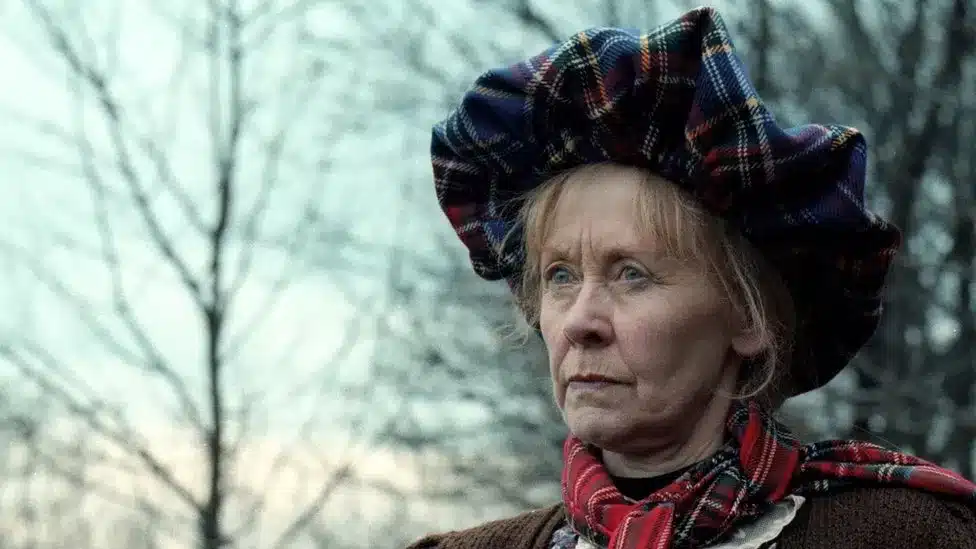
ITV/Shuttershock
Adela’s* story
Adela has eyes that sparkle with love and tenderness, tempered with a steely determination to prove the experts wrong.
Two years ago, experts at a local medical centre said that it wasn’t possible to find foster parents for Radu*, a young boy with disabilities. At three years old, Radu, who has Down’s Syndrome, weighed just 6kg. He had several health problems, including allergies, digestive issues, neurological challenges, and an unsupportive spine. He couldn’t support his own head. The doctors said that if he left the institution, he’d die.
But Adela and her husband, Dumitru*, believed otherwise. She knew that with love, care and the proper support, Radu could have a better life.
“We are stubborn, and we decided to fight for this child.”
And she was right. Radu improved drastically after moving in with Adela. Two years on, he supports himself, walks, dances to music, and is able to chew and digest food of all types. He’s even overcome fruit allergies, and is now a healthy weight.
Inside orphanages, children like Radu just can’t get the support they need to thrive, even if they’re surrounded by medical staff. That’s why we do whatever it takes to get them back to family.
When I asked Adela what had made the difference, she said: “It was our love and care, he’s our family now, and he’ll live with us for the rest of our lives.” A true Super Gran.
“He’s our family now, and he’ll live with us for the rest of our lives.”
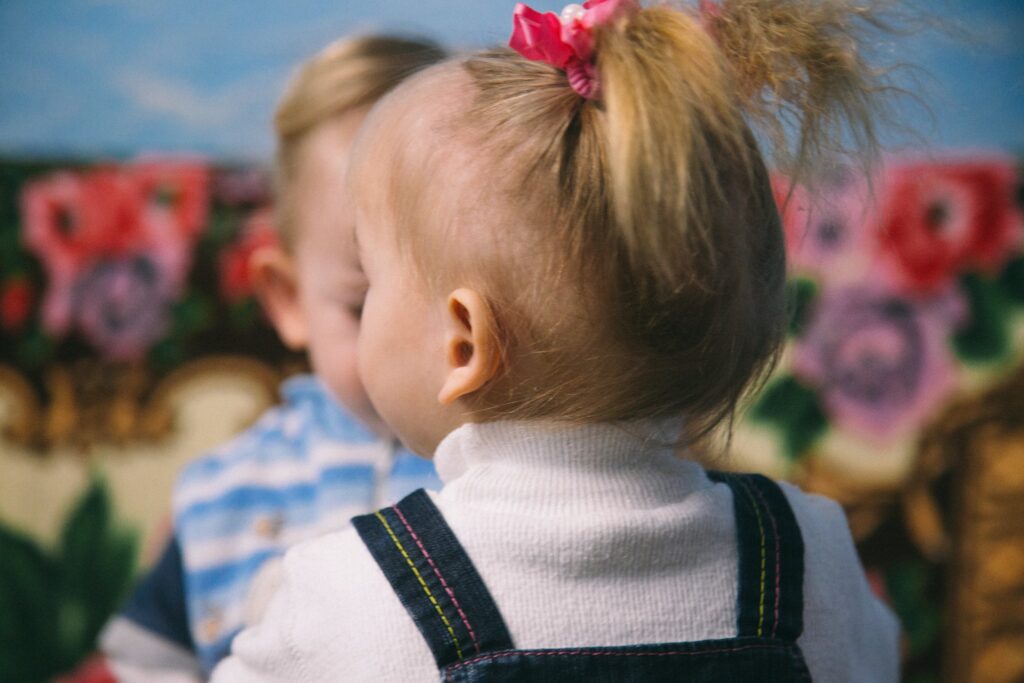
CCF Moldova/Hope and Homes for Children
Maria’s* story
Maria has eight grandchildren of her own, and an incredible capacity to love, protect and nurture.
Alongside her partner, Petru*, Maria became a parent once again after deciding to foster four children: Oleg*, Miron*, Elena* and Ana*. All siblings, all aged between two and eight, each of these kids had been left in one of Moldova’s large state-run orphanages for babies and young children. Thanks to Maria, these kids found their way out of the institution and back to family.
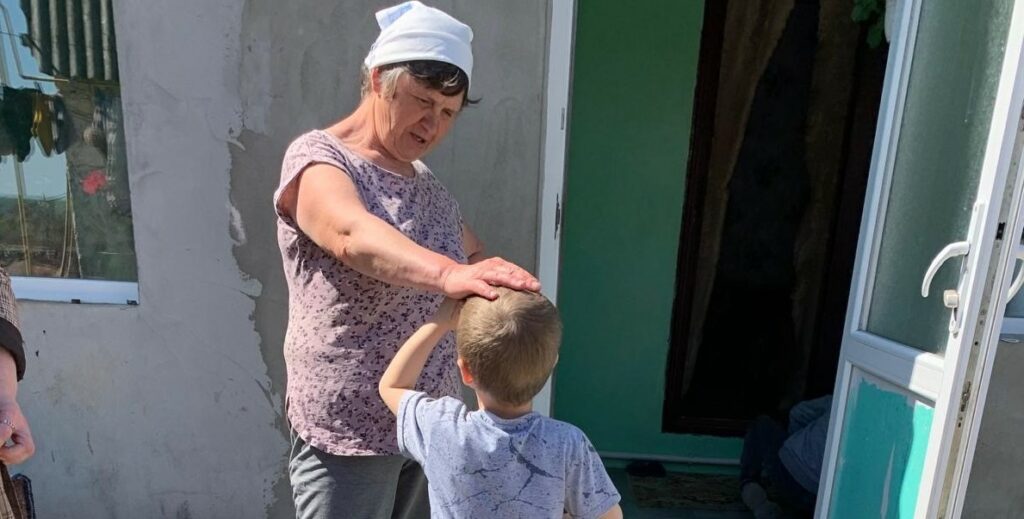
Hope and Homes for Children
Today, the small menagerie of animals Maria and Petru look after adds to the noise of the children’s happy new lives together. Now, they’re spending their days playing in a safe environment with a beautiful garden – beginning their journey of healing, together as a family.
Valentina’s* story
Valentina and George*, her husband, have three grandchildren, Andreii*, 14, Dana*, 10, and Bogdan*, two.
When they were young, Andreii, Dana and Bogdan’s mum struggled with addiction and was unable to care for them. Andreii and Dana moved in with their grandma, and Bogdan was born years later.
Sadly, Bogdan was neglected. He weighed just 5kg at six months old. As a result, he was placed inside an orphanage.
But Valentina was determined to rescue Bogdan so he could grow up alongside his siblings. Not inside an orphanage. She fought for guardianship rights, and after a lengthy process won.
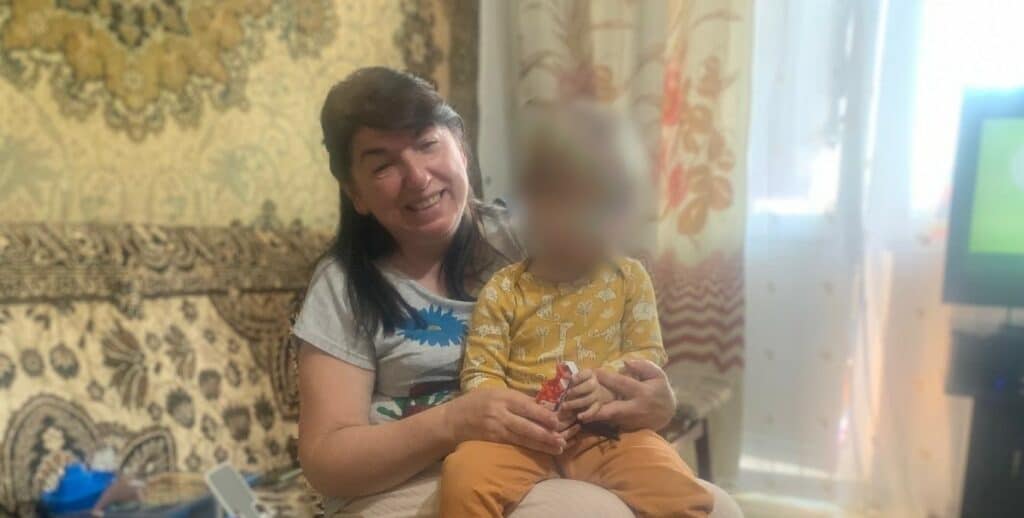
Hope and Homes for Children
Now, eighteen months later, Bogdan’s toy cars cover the floor of their flat. It was a delight to see him at a healthy weight, eating normally and developing as he should. Finally, back to family.
Olga’s* story
Olga is a mother and wife who stepped in to care for her niece, Tatiana*.
When Tatiana was six months old, Olga’s sister-in-law left her baby and moved away. Olga will never forget the night when she found baby Tatiana, all alone, without being fed or even having her nappy changed.
“If I hadn’t been there that evening, I don’t think she would have survived until the morning.”
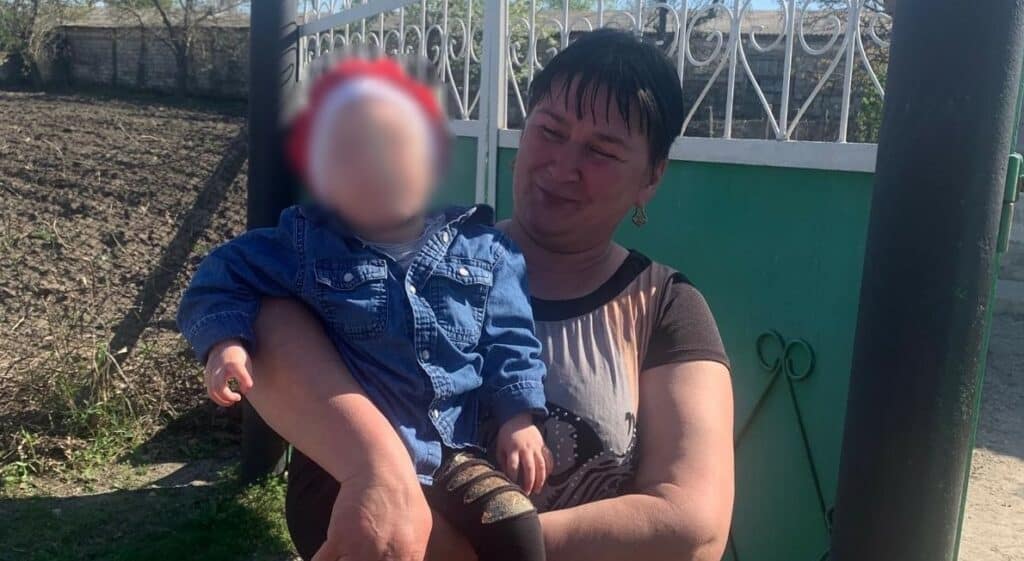
Hope and Homes for Children
Olga and Sergiu*, her husband, took Tatiana in immediately.
Eighteen months later, Tatiana now two, is doing much better. Olga is now her legal guardian, ready to raise her in a loving, family home.
“I have a grown-up son and am having to relearn how to be a mother again,” says Olga, “but Tatiana will stay with us now. We will give her every opportunity in life.”
Thank you for helping families fostering children in Moldova
“Super Gran may be a work of fiction but I have met the real deal.”
I am in awe of the super grans and grandads we met in Moldova. Whether it’s rescuing their grandchildren from tragic circumstances or rescuing someone else’s children through foster care, their superpowers were truly evident.
Alongside our local partners, CCF Moldova, it’s an absolute privilege for us to support these families. From providing legal aid to emotional support, emergency supplies to food and schooling, your donations are helping strength back to family. All across Moldova.
Thank you for your continued support. You’re helping support super grans like Adela, Maria, Valentina and Olga – inspiring carers fostering children in Moldova.
By Pete Garratt
Director of Global Programmes, Hope and Homes for Children
Will you help bring millions of separated children back to family? Donate today.
* Names changed to protect identity.
The post From Moldova: Meet the grandmas bringing children back to family appeared first on Hope and Homes for Children.
]]>The post Harnessing the potential of EU accession to drive care reform: Spotlight on Ukraine and Moldova appeared first on Hope and Homes for Children.
]]>Currently, all EU funding regulations and relevant policies contain measures for shifting from institutional to family and community-based care, thanks to the continuous, close collaboration between civil society and the EU institutions.
However, we have increasingly been advocating for transferring this approach to the EU accession process.
EU candidate countries share a common aspiration: becoming an EU Member State. To achieve this, they must undertake reforms in a number of areas and align with the EU standards, the so called ‘EU acquis’. As Hope and Homes for Children, we strive to ensure that the EU monitors and supports child protection and care system reform in EU candidate countries, as an integral part of their accession journey.
And we’re starting to see some very promising recent developments.
Advancing care reform throughout Europe
In October, the European Commission recommended further advancement of care reform in all ten 2023 Progress Reports that constitute the EU Enlargement Package. This brings an unprecedented opportunity for simultaneous care reform processes throughout Europe, that could effectively lead to the end of child institutionalisation, and result in children growing up in safe and caring families.
These are just some of the relevant excerpts from the reports:
Learning from the past: European Commission brown bag lunch on child protection and care reform in EU enlargement countries
- De-institutionalisation actions are taking place, but need to be further taken forward at a sufficient pace. (Albania)
- Bosnia and Herzegovina needs to urgently develop and adopt a deinstitutionalisation strategy to move towards community-based care.
- Georgia lacks a national strategy on the de-institutionalisation of children. However, the government has made steps to deinstitutionalise remaining non-state regulated religious residential institutions. Further measures are needed to address the lack of proper standards in boarding schools.
- A comprehensive strategy for child protection is necessary to accelerate deinstitutionalisation and the transition towards quality, family- and community-based care services, including with an adequate focus on preparing children to leave care. (Kosovo)
- …deinstitutionalisation of children with disabilities is progressing, [but] insufficiently qualified staff, lack of resources and poor infrastructure hinder the specialised care and support for institutionalised children with disabilities. (Moldova)
- The deinstitutionalisation strategy, initially planned for Q4 2022, has yet to be adopted. (Montenegro)
- Implementation of the 2018-2027 national deinstitutionalisation strategy continues. This involves a transition from institutional care to family and community-based care with support from social services. (North Macedonia)
- implement and report in good time on the strategies on anti-discrimination that includes the rights of LGBTIQ persons, gender equality, violence against women, and deinstitutionalisation; actively counter hate-motivated crimes and establish a track record of investigation and convictions (Serbia)
- Ukraine should develop and adopt a comprehensive de-institutionalisation reform of childcare and launch its implementation, considering the situation of displaced children in the upcoming year.
- Adequate funding should be directed towards reinforcing community-based care and ensuring proper deinstitutionalisation. Particular concern is caused by the construction of new institutions following the earthquakes and the wars in Syria and Ukraine. (Turkey)
Bringing our experience to bear
Following the Enlargement Package publication, the Commission held an internal webinar, focused on care reform, in close collaboration with us and Lumos. EU representatives, based in Brussels and EU candidate countries alike, joined the online event and shared key EU commitments and initiatives to support child protection and care reform in EU candidate countries. This event was a timely opportunity to discuss current opportunities to promote progress in countries in the process of accessing EU membership with EU staff.
Alongside others, we shared insights from former and ongoing EU accession processes, in particular Bulgaria. Our colleagues gave joint recommendations on how to ensure child protection and care reform is achieved in the midst of the EU accession process. We shared lessons learnt from Bulgaria, where progress is down to resolute political will and technical and financial assistance from the European Union – including pooled resources between the EU Directorate-Generals for Regional and Urban Policy (DG REGIO) and Employment, Social Affairs and Inclusion (EMPL), and collaboration with civil society organisations like us.
Despite this, our experts highlighted that efforts must be maintained to ensure the completion of child care reform in Bulgaria, where four institutions for young children with disabilities remain. This ‘looking back’ exercise resonated with our experts from Ukraine and Moldova; our work in these countries will continue to draw on our years of experience working in past and current EU accession countries alike.
Making care reform a reality
This is all very positive, but in order for care reform to really advance and be completed in a quality and sustainable way, it must be properly funded. This would mean governments making sure that some of the Instrument for Pre-accession Assistance (IPA) III, the Neighbourhood, Development and International Cooperation (NDICI) funding, as well as under any new funding instrument or package, are ringfenced for care reform. As we have been operational in Ukraine and Moldova for decades, it is only natural that we follow more closely the developments in these countries.
Recently, there have been two outstanding opportunities for advancing their care reform: the Ukraine Facility Regulation and the EU Support Package for the Republic of Moldova.
Ukraine
Given
- the objectives listed in the Ukraine Facility Regulation, such as
- contributing to the recovery, reconstruction and modernisation of the country, and
- progressively aligning with the EU acquis
- and the high number of institutionalised children, addressed also in the EC Opinion on Ukraine’s application for membership of the European Union,
it is logical that the Ukraine Facility, and the mirroring Ukraine Plan, support a comprehensive reform of the child protection and care system in Ukraine.
Moreover, the European Commission has already granted €10m to Ukraine for the development of a modern child care strategy. Funding its implementation is the next step for securing family care for the thousands of institutionalised and orphaned children, threatened by Russia’s war of aggression against Ukraine.
As care reform was not included in the original EC proposal, we mobilised eleven key child and disability rights Ukrainian and international organisations and networks around joint proposals for amendments. The European Parliament has taken these on board in their report on the Regulation. We then directed our advocacy efforts towards the Council and the Commission and are now expecting the outcome of the trialogues, the negotiations between the three EU decision-making bodies.
Moldova
Similarly, the EU Support Package for the Republic of Moldova could be instrumental for completing care reform for children in Moldova. Especially, when the 2022-2026 National Child Protection Programme and Action Plan provide the necessary base for completing the care reform of children. The implementation however has been delayed due to lack of resources. Our analysis, endorsed by 11 Moldovan and international organisations, demonstrates that care reform could be funded under two of the three Package priorities: Economic development and connectivity and Administrative capacity. A successfully completed reform in an EU candidate country will set an example for all the other accession and partner countries.
Where there’s a will, there’s a way
Ultimately, systematic inclusion of child care reform as a key, priority requirement for EU accession requires resolute political will.
We believe we can secure this by:
- advocating towards the EU to ensure it champions child care reform in the negotiations towards accession
- supporting national and regional child care advocates, so they can seize opportunities to advocate for child care reform in the context of EU accession.
To support the launch and implementation of care reform in EU candidate countries, we’re currently working on producing guiding documents tailored to these two audiences. These build on our decades of experiences in the European Eastern Neighbourhood region. We are looking at launching them early next year, with the hope that they will be a useful tool for governments, EU institutions and civil society actors, working on care reform for children.
Authors: Irina Papancheva, Marie Raverdeau
New Report
Read the report of our speakers’ presentations at the DG NEAR internal webinar ‘Child protection and care reform in Enlargement Countries’
Child Protection and Care Reform in EU Enlargement Countries
The post Harnessing the potential of EU accession to drive care reform: Spotlight on Ukraine and Moldova appeared first on Hope and Homes for Children.
]]>The post “Be the change” – Liliana reflects on Women’s History Month appeared first on Hope and Homes for Children.
]]>Today we hear from Liliana Rotaru, CEO of CCF Moldova, our partner organisation, who shares her views on being a female leader, her biggest achievements and the crucial importance of listening to women’s voices when implementing childcare reform.
What year did you join Hope and Homes for Children?
I joined Hope and Homes for Children in 2005 when Hope and Homes for Children and CCF Moldova, where I’m CEO, started a strategic partnership.
What does International Women’s Day mean to you, as a leader of an organisation working to ensure every child has a safe family home in Moldova?
While supporting families to look after their children in a loving and nurturing environment, I have noticed that most families are relying on women to care for the family, look after them and solve problems. It’s even truer in the case of single mothers.
I have witnessed what a woman’s love and courage can do for a child. Even when all circumstances are unfavourable, most mothers will fight till the end for their children.
When the women feel “it’s them against the world”, we are proud and privileged to be in their corner.
A strong and loving woman in every child’s life (and sometimes it’s an aunt or a granny or a foster carer) can change that life by bringing into it hope and light.
What is your biggest achievement or proudest moment as a leader since you joined HHC? How did this make you feel?
My colleagues, who work directly with families in Moldova have many of these moments.
I remember a single mum whose two young children were taken to an institution for babies while she was working abroad.
When she came home, she could not get her children back as she did not have a place to live or a job with sufficient income. She was also illiterate.
It was a vicious circle as she lost her mum as a child, and was placed from family to family. She felt unloved, and not wanted.
We met with her and, after some time, we were able to buy her a small house. I have never met a person so proud of her little house – it was clean, smelled fresh and had used but washed and ironed curtains on windows.
Her children were back with her and they celebrated her 6-year-old girl’s birthday for the first time.
She said she is going to learn to read so she could help her children do well in school. She had dreams for her children to become a nurse and the village mayor and she knew they needed to stay in school. I was most impressed when she said that when she will receive her first salary, she plans to help a family in need just as she was helped and supported.
Why is it important that women’s voices are included in decision-making around childcare reform in Moldova?
Both men and women have a voice, a unique experience and a perspective on childcare reform. The more diverse and complementary these opinions are, the better childcare we are going to have in Moldova. The social work field in Moldova is mostly represented by women. However, more decision-makers are men than women.
How do community services and access to childcare help break the glass ceiling for women in Moldova?
Education and skills development, awareness, actions to develop daycare and free daycare for single mums. An example of this best practice is the social nursery concept that we have been promoting since 2011.
Women should have access to leadership skills, grants, entrepreneurial skills development, coaching and mentoring, day care services and financial services.
Employability skills and income-generating activities for women reduce the risks of gender-based violence and poverty. We need to do more of these to help break the glass ceiling.
What message or words of encouragement do you have for aspiring women wanting to make positive change in the world?
I encourage all women who are able to fight to change the problems they see in the world – to start working for that change and start mobilizing support. Especially now, in the digital era, it can be fast, cheap and easy and BE THE CHANGE.
Dr Liliana Rotaru is the Director of Children, Communities and Families (CCF). She was awarded the 2020-21 United Nations General Award for Outstanding Human Rights Achievement at national level in Moldova.
The post “Be the change” – Liliana reflects on Women’s History Month appeared first on Hope and Homes for Children.
]]>The post “I wish we were home, but I like it here as well”- Celebrating Christmas with refugees in Moldova appeared first on Hope and Homes for Children.
]]>We’ve been working closely with CCF Moldova to support refugees who fled the fighting to find safety across the border. In this blog, Liliana gives us an insight into a particular type of festive support which made all the difference to refugee children during the holiday period – Christmas celebrations.
“Thank you for coming and sharing in our celebration.”
This is what a little girl told us at the Christmas celebration we held at the Refugee Accommodation Centre (RAC) in Chisinau, Moldova. The children at the centre enjoyed songs and dancing, sweets and presents from Father Christmas, and time spent together with their loved ones.
A Christmas celebration should not be an out-of-the-ordinary event for children, but the war in Ukraine made this Christmas party very different.
Feeling far away from home, celebrating with people they didn’t even know a few weeks or months ago, worrying about their loved ones who stayed behind to fight and help win the war – these are the concerns that children and adults fleeing the crisis in Ukraine are facing.
In 2022, we worked with almost 12,000 refugees, both adults and children. We’ve offered many vital types of support – from food, hygiene supplies and information, to counselling, activities for children, and devices for online schooling.
But at this time of year, what brings back some feelings of normality is the return to Christmas traditions and celebrations.
Will Santa find us in our new country?
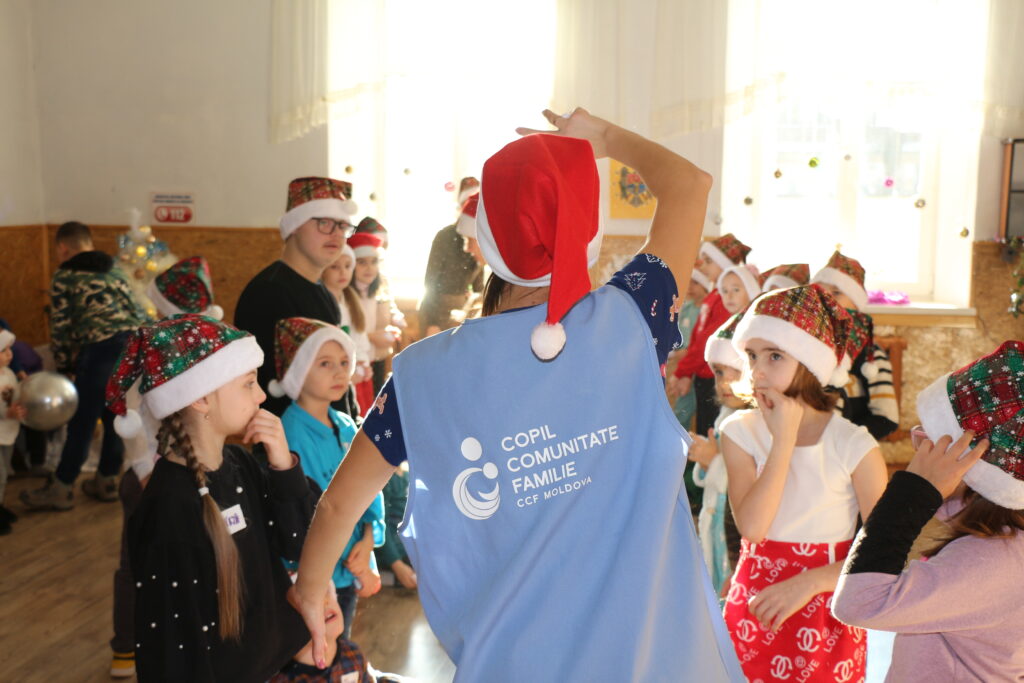
In early December, our facilitators did a round of consultations with caregivers and children at each of the Refugee Accommodation Centres and planned Christmas celebrations together. Children kept asking if Santa would find them in their new country and if he would have the money to bring gifts to everyone. So, with the support of Hope and Homes for Children’s donors, we helped organise seven Christmas celebrations all over the country, well attended by 276 children and over 100 adults.
The end of December brought with it Christmas cheer and spirit. Children sang carols and patriotic songs while holding their little hands over their hearts – it was moving and very special. In one of the centres, children learned a carol in Romanian and sang it to staff and their parents. Parents participated too and, in another centre, parents prepared a dance for the Christmas celebration.
We provided Christmas trees and decorations for children to make their temporary homes beautiful, we brought sweets for all children and organised magic activities and games.
Helping families keep going

Parents told us that they dream of going back home, but that over the last months, the activities organised for them and their children have been what’s kept them going. They said that if the war continues, they hope they can come back for more get-togethers and more activities for their children, so they can make friends, enjoy their childhood, and forget the sadness in their home country.
A 15-year-old boy in one of the centres told us that back home they had parties, sang and recited poems, received gifts and enjoyed the company of friends and family. He ended by saying: “I wish we were home, but I like it here as well.”
At that moment, we felt honoured and humbled to witness the children’s joy and happiness reflected on their parents’ faces.
Dr Liliana Rotaru is the Director of Children, Communities and Families (CCF). She was awarded the 2020-21 United Nations General Award for Outstanding Human Rights Achievement at national level in Moldova.
The post “I wish we were home, but I like it here as well”- Celebrating Christmas with refugees in Moldova appeared first on Hope and Homes for Children.
]]>The post What I learnt from visiting refugees in Moldova appeared first on Hope and Homes for Children.
]]>We travelled 2,000km through the cities which have Accommodation Centres for Refugees, and through the villages where refugees are living within the local community.
The stories we heard moved us to tears. I don’t think there’s anyone on the face of this earth who would stay indifferent while a 13-year-old child explains how the school he used to go to was recently destroyed by a missile.
Nadejda’s story – hope amid the explosions
In a small town in the north of Moldova, in an old house, a family from Nikolaev, in the south of Ukraine, found their refuge. Or rather, part of the family found refuge — the mother, her two children and their grandmother. The father stayed in Ukraine, as he was not allowed to leave the country. The boy is 13 and his younger sister is only eight months old. The story of the baby shook me enormously.
On 24 February, when Russia attacked and invaded Ukraine, Daniela*, the mother, who was pregnant at the time, suffered a shock from the explosions, which caused her to give birth prematurely.
So, on 25 February, underneath the sound of explosions in the bomb shelter of a maternity hospital in Nikolaev, a little baby girl was born. The girl was given a very inspiring name — Nadejda, which in English means ‘Hope’.
A few weeks after the start of the war, for the sake of her children, Daniela fled Ukraine with the children and their grandmother and took refuge in Moldova, where some relatives offered them a house to stay in temporarily.
The family may not have the best living conditions. But they do have a clear and peaceful sky above their heads, and the help of Hope and Homes for Children and CCF Moldova, who are providing them with food vouchers, hygiene products and the support they need to have a safe and healthy life.
Dragos looking after eight-month-old Nadejda, whose name means ’Hope’, outside the house where they’re currently staying with relatives.
Photo: Hope and Homes for Children
Two young brothers and their dog
During a visit to a Refugee Accommodation Centre (RAC) in the village of Cojusna, about 30 km from the capital, Chișinău, I talked to several refugees to find out their stories.
I was touched by a story of two brothers from the Odesa region, who are five and eight years old. They were with their mother, who told us that she resisted leaving when the city and the region were initially bombed, but in the end, the relatives insisted that she and the children leave Ukraine for their safety.
The children are happy in Moldova. The eldest is in the 2nd grade and takes online lessons. They also had a big black dog there with them in the centre. When I asked about the dog, the children excitedly told me how they played with it, and how they brought it from Ukraine. But they were also sad because there was another dog the family had left back home in Odesa. They had to choose which dog to take, as it was almost impossible to leave Ukraine with luggage and two dogs.
However, the sadness of the story did not last long because more children soon appeared in the corridor, and they all started running through the halls of the building as if it was a competition.
Children don’t need much to be happy. But what they do need is peace, safety, family and support.
This centre is just one of 7 Refugee Accommodation Centres that we’re supporting across the country, providing fun activities, setting up playgrounds, providing psychological support to children and their parents, and offering vouchers for food and hygiene products. All families are monitored by social workers from the community and in difficult cases, they refer families to us for additional support.
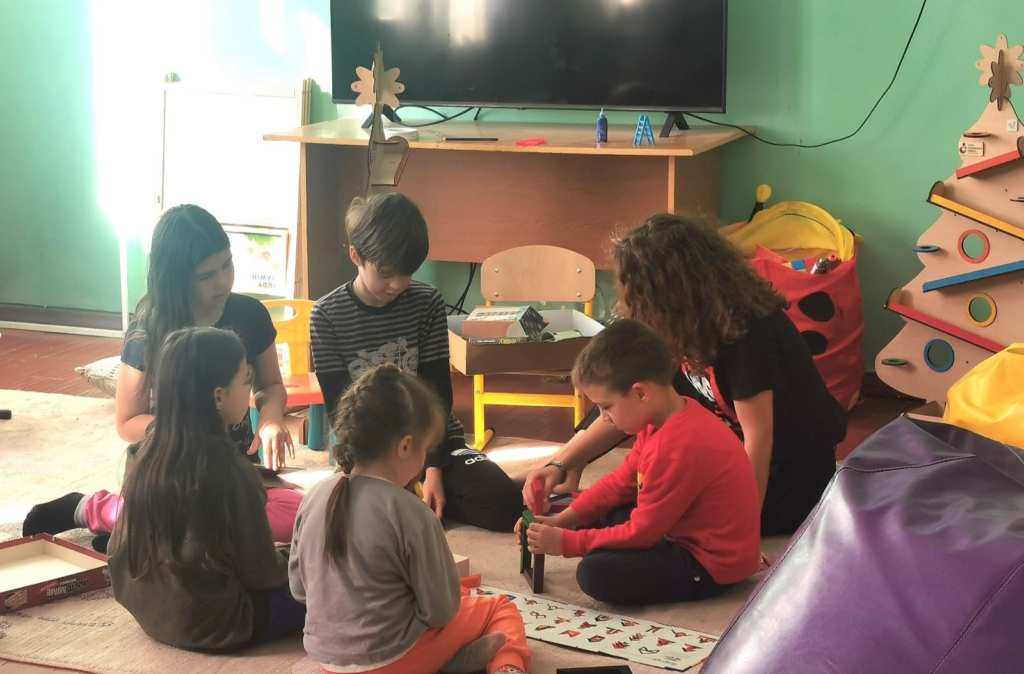
Four sisters who escaped by train
In a village in the north of Moldova, inside a house with an enormous yard, I met four sisters from Zaporozhye. Their history is worthy of a Netflix movie.
Zaporozhye is one of the most bombed cities and regions in Ukraine, and the sisters had no choice but to leave. Of the four, only one is 18. So she is the legal guardian of the other three girls.
The girls told me how they escaped by train from Zaporozhye in Eastern Ukraine, to Lviv, in Western Ukraine. Because the train was so packed, especially with older people and mothers with babies, the girls had to stand on their feet for the entire two-day journey until they reached their destination. After arriving in Lyiv, they decided to leave Ukraine and took refuge in the north of Moldova, where they had some relatives who provided them with a house.
While I was talking to them, one was doing an online lesson with her teachers who were still in Ukraine. Suddenly, the teacher announced that she would have to pause the lesson so she could retreat to the bomb shelter. The alarm was ringing in the city — a sign that missiles were coming. The children watched all of this online, in real-time.
The girls were sad, as they spoke to me. Considering what they’ve been through, this is more than expected. But the insanity of their case truly shook me.
Since the girls left the Zaporozhye region, which was still part of Ukraine at the time, to take refuge in Moldova, Russia annexed the Zaporozhye region and declared it Russian. Technically, that means that if these children decide to go back home today, they would be returning to a territory already annexed to another country.
However, the Ukrainian army now currently controls the sister’s hometown. Although it’s still bombarded every day, the sisters can still talk daily with their colleagues and friends still living there, so they are aware of the news.
One of the many ugly parts of war is that it turns children into adults, prematurely. This was something that was incredibly apparent as I visited refugee children in Moldova.
With support, I hope we can create a future where all children in Moldova are happy, safe and thriving.
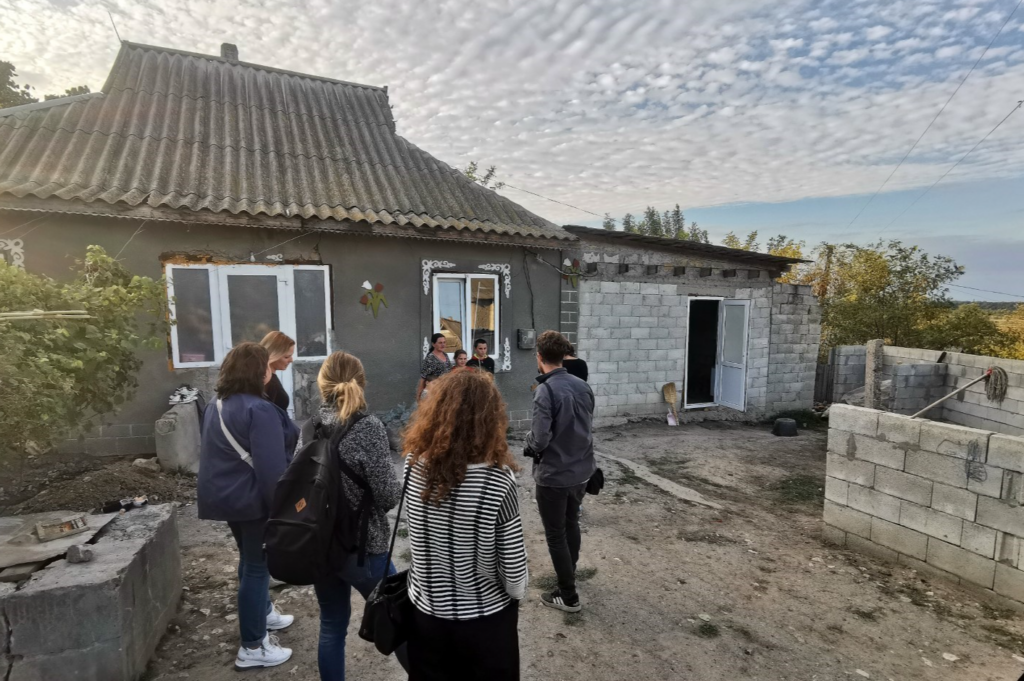
These children are now ‘our’ children
I started work as a National Fundraising Officer at CCF Moldova in May 2022. I returned to Moldova after five years of living abroad to get involved with helping Moldovan children. I did this because I understand the realities and poverty in Moldovan society.
The war in Ukraine and the 100,000 refugees (half of them children) who came to Moldova has put enormous pressure on our system and social services. Moldova’s social needs have doubled.
In my philosophy, there is no concept of “our children and their children” – I tell this to everyone. The tens of thousands of refugee children who entered the territory of the Republic of Moldova automatically became our children. And we have to take care of them.
As we get deeper into winter and the temperatures go down to freezing, our children and their families need even more support to stay alive, healthy and warm.
Author: Dragoș Galbur, National Fundraising Officer at Hope and Homes for Children Moldova / CCF Moldova
If you’d like to help, please consider making a donation to our Winter Crisis Appeal. Thank you.
The post What I learnt from visiting refugees in Moldova appeared first on Hope and Homes for Children.
]]>The post Keeping foster families safe and together in Moldova this winter appeared first on Hope and Homes for Children.
]]>Soaring inflation – currently at 34% – an energy crisis, and war in neighbouring Ukraine have put a huge strain on Moldovan families. Despite the rising costs of food and fuel, earlier this year, foster families were still receiving the same amount of money to look after vulnerable children in need of protection. The difficult economic conditions have been causing untold stress for many of these families, who are desperate to keep helping their children, but unsure how to make ends meet.
Thankfully, our partners CCF Moldova, who have been working alongside the Ministry of Labour and Social Protection, were able to launch a voucher scheme to deliver top up vouchers to all foster families, to help them through the current crisis.
“By distributing these top up food vouchers, we’ve been able to help reduce the level of stress and possible negative coping strategies for these families. Not only that, but we’ve helped avoid the worst possible outcome for children – to be removed from foster families, who can no longer afford to care for them”
CCF Moldova Director, Dr Liliana Rotaru
Thanks to all our generous supporters, the vouchers will help pay for food and save money for bills. They’ll enable families not only to buy more nutritious food, but will also leave a little room for fun – the holiday sweet treats or small gifts that every parent wants their child to enjoy at Christmas.
The voucher scheme has been warmly welcomed by the Ministry of Labour and Social Protection. On 11 October, ministry representatives joined our Moldovan colleagues to hand out vouchers to families in two counties and then posted a short article on their website (in Romanian).
All families have responded very positively to the scheme
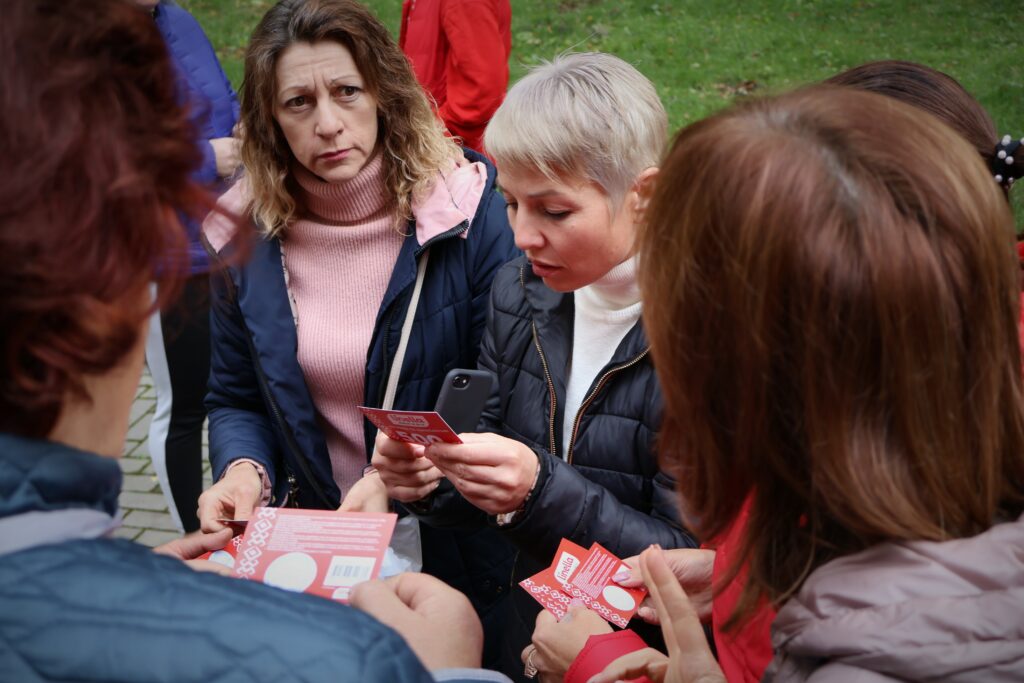
This is what active family support looks like. Read more on how we keep families together.
Support our #WinterCrisisAppeal
Help us protect families and keep them together — through war, through winter and beyond.
The post Keeping foster families safe and together in Moldova this winter appeared first on Hope and Homes for Children.
]]>The post Responding to the refugee crisis in Moldova appeared first on Hope and Homes for Children.
]]>With so many people arriving from Ukraine, the way we work with families has also changed. In early March, we started to shape our response to the refugee crisis.
Currently, we are helping families living in 16 refugee accommodation centres (RACs) in the northern part of Moldova. We will begin working in two more RACs in the near future.
Based on signed MoUs (Memorandum of Understanding) with local public authorities, in all 16 RACs we have provided hygiene and food supplies, focusing on more specific items such as baby food and hypoallergic food items. We have also equipped free play corners to be open around the clock for children and their families. We have set up informative corners and provided arts & crafts supplies for children.
At the end of February, the world as we know it changed.
One mom told us that reading together was a big part of her and her son’s routine when they were home. But when she left, she had not managed to pack any books. We have provided them with books to read, and drawings to look at – bringing back a small piece of normalcy for her and her son.
In another RAC in northern Moldova, a 12-year old has asked for acrylic paints so she can pursue her hobby and put in colours her emotions. She told us that her father works abroad while she, her mum and younger brother are in Moldova. She really wants to go back home to her friends and grandparents. She told her father that she is getting better at her art and she will sell some of her paintings so they get the money to go back home, and life can return to how it was before the war.
She told her father that she is getting better at her art and she will sell some of her paintings so they get the money to go back home
Some families are making longer term plans. They are planning what to do if the war continues and their home towns are not safe to return. One mum with a 15-year old plans to move out of the RAC and go to Chisinau to find work. She plans to enrol her son in a local school, mentioning that “education is the most important asset.” They will need support in finding employment, legal advice on contracting, support with school enrolment and other move-related priorities.
In some RACs, we are planning structured activities with caregivers and children to support their social-emotional development. 8 staff members have received training to do this from War Child Netherlands in TeamsUp.
Additionally to ensure integration, we plan to pilot a voucher based intervention for both refugee and host families, based on several criteria – age, disability, family size etc.
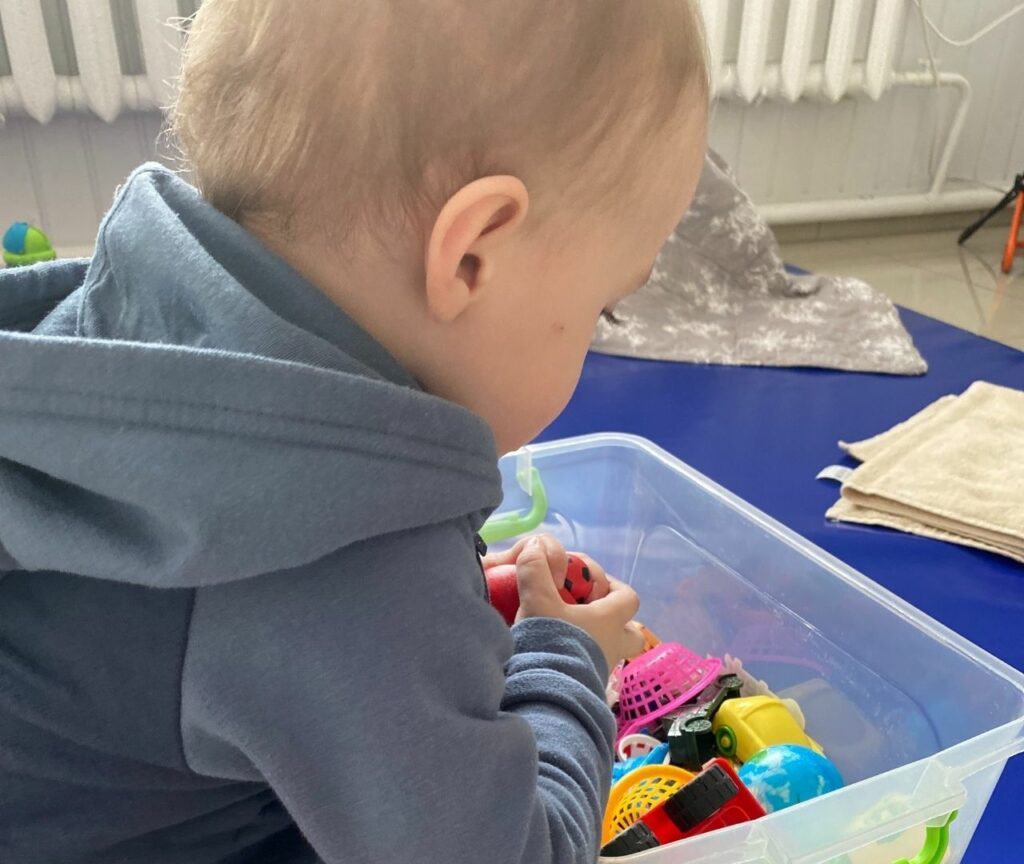
Liliana Rotaru is the chairperson of CCF Moldova, our partner organisation in Moldova.
Ukraine Crisis Appeal We Need your help
By supporting our work across Ukraine, Moldova and Romania you can help protect children and families right now and in the aftermath of this war.
The post Responding to the refugee crisis in Moldova appeared first on Hope and Homes for Children.
]]>The post “I saw that Ana loved her children and she fought for them.” appeared first on Hope and Homes for Children.
]]>The authorities thought both her children would be better off in an institution. But orphanages do not protect children, they harm them.
Consigning children to one-size-fits-all institutions, puts them at high risk of neglect and abuse and threatens their fundamental development. This is especially true for children as young as Vasilica and Ecaterina. To feel safe and happy, to grow, learn and really thrive, all children need to know that they are loved, and they belong; they need families.
Ana battled for two years to bring her children home again. Through our local partners, CCF Moldova, we made sure she had the practical and emotional support that she needed to succeed. “I saw that Ana loved her children and she fought for them,” says Natalia, the experienced social worker who stood by her, every step of the way.
In the orphanage, Vasilica spent long hours alone in a cot with no one to play with him, encourage him or love him. Today, reunited with his family, he’s a very active, much-loved little boy who likes building tall towers with his wooden blocks and playing chase with his sister.
Natalia is continuing to make sure that Ana has the specialist support and advice she needs to continue to care for Vasilica at home. Their next goal together is to make sure that he can attend nursery and then school, so that he can continue to learn and develop, alongside his sister and the other children in his community.
Support our work Help bring children home
With your support, we can reunite families torn apart by orphanages
The post “I saw that Ana loved her children and she fought for them.” appeared first on Hope and Homes for Children.
]]>The post Bringing Mihai back home to the people who love him appeared first on Hope and Homes for Children.
]]>When Mihai was eight years old, he was shut in a small room by himself for three weeks with no toys, no books and no one to talk to. Staff in white coats and plastic gloves watched him through a large internal window and passed him food three times a day. This was the Isolation Unit in the orphanage in Moldova where Mihai had been sent because his family had nowhere to live. His mum, Valentina, was struggling to care for Mihai and his new-born baby sister, Amelia, on her own.
The authorities gave Valentina and Amelia a place in a Mother and Baby Unit and sent Mihai to the orphanage. They believed he’d be safer there. But orphanages do not protect children; they harm them, denying children the love and individual care that’s so vital to their development, their happiness and their well-being.
“The children were sad there. All of them were somehow afraid of their carers.”
For example, every new child that enters the orphanage where Mihai was sent, even babies and toddlers, spend 21 days alone in the Isolation Unit to make sure they’re not carrying any infections. It’s hard to imagine what a traumatic experience this must have been for Mihai, so soon after being separated from his mum and his sister. When this ordeal was finally over, Mihai spent a further six months in the main orphanage, with no one to love or protect him. “The children were sad there,” he told us. “All of them were somehow afraid of their carers.”
“Who will love Mihai if not me?”
Valentina is a loving and courageous mother who knew from bitter experience what her son would be going through. She spent her own childhood, confined to a loveless institution, after both her parents died in a car crash. “Who will love Mihai if not me?” she asked us in despair.
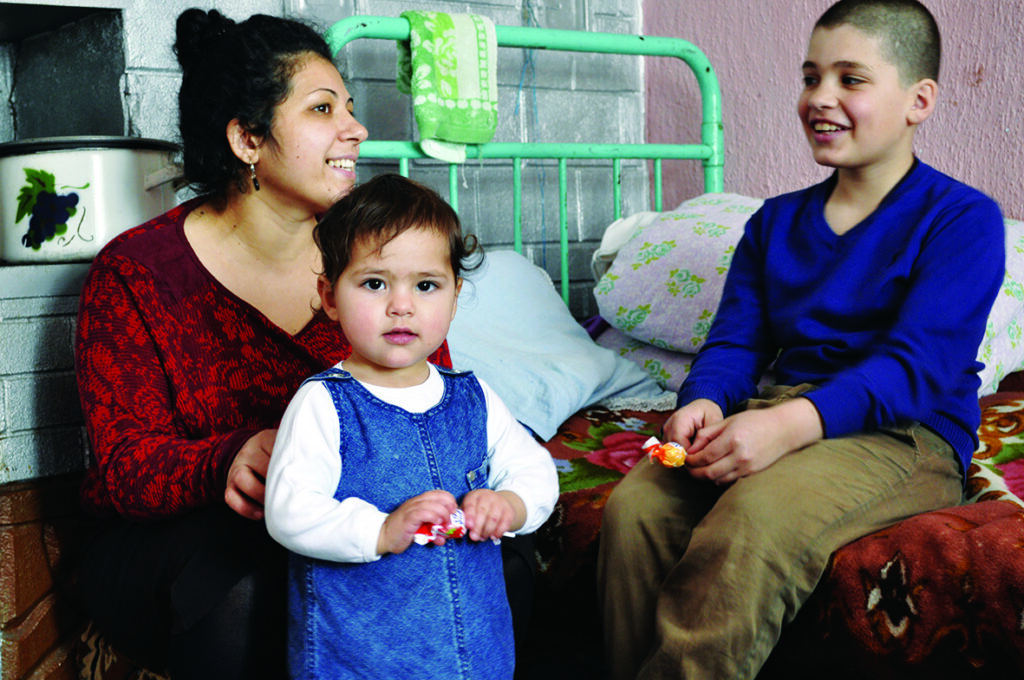
That’s when our partner CCF Moldova stepped in. A local team of skilled and dedicated professionals, they worked with the local child protection authorities to reunite Mihai with his family. Their specialist social workers made sure the family had a safe, permanent place to live and gave Valentina all the practical and emotional support she needed to continue to care for her children herself.
Now Mihai is overjoyed to be home again and growing-up with the people who love him, in the place where he belongs.
Support our work We need your help
Your donation will help us reunite families like Mihai's.
The post Bringing Mihai back home to the people who love him appeared first on Hope and Homes for Children.
]]>